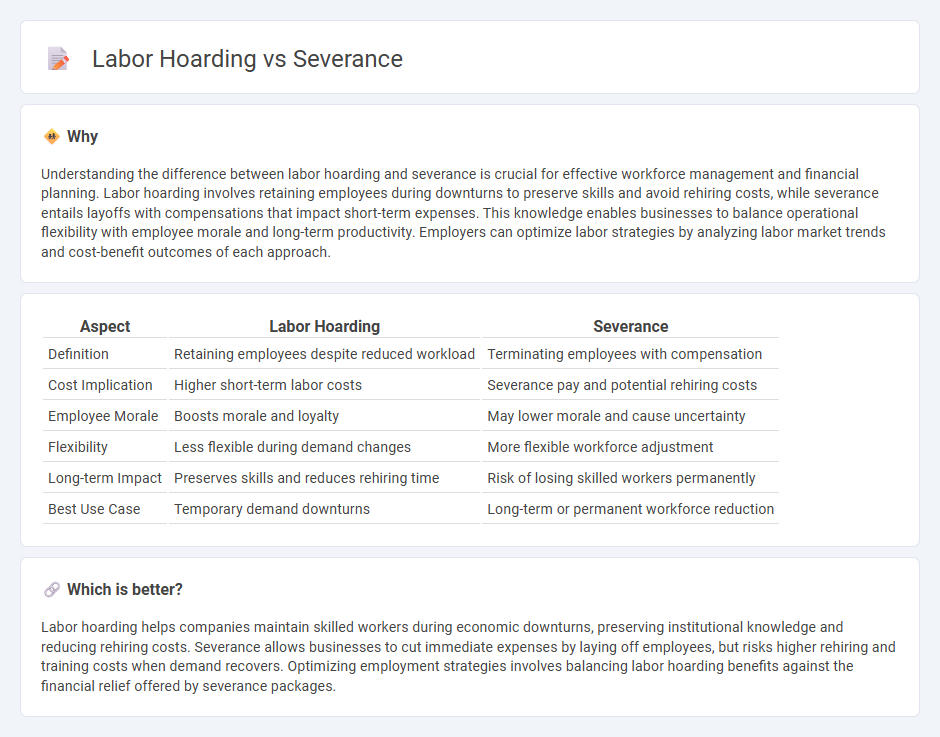
Labor hoarding involves retaining employees during economic downturns to preserve skills and maintain productivity, reducing future rehiring costs. Severance, on the other hand, entails terminating employees with compensation packages, allowing firms to cut immediate labor expenses but risking loss of experienced talent. Explore the benefits and drawbacks of labor hoarding versus severance to optimize workforce management strategies.
Why it is important
Understanding the difference between labor hoarding and severance is crucial for effective workforce management and financial planning. Labor hoarding involves retaining employees during downturns to preserve skills and avoid rehiring costs, while severance entails layoffs with compensations that impact short-term expenses. This knowledge enables businesses to balance operational flexibility with employee morale and long-term productivity. Employers can optimize labor strategies by analyzing labor market trends and cost-benefit outcomes of each approach.
Comparison Table
| Aspect | Labor Hoarding | Severance |
|---|---|---|
| Definition | Retaining employees despite reduced workload | Terminating employees with compensation |
| Cost Implication | Higher short-term labor costs | Severance pay and potential rehiring costs |
| Employee Morale | Boosts morale and loyalty | May lower morale and cause uncertainty |
| Flexibility | Less flexible during demand changes | More flexible workforce adjustment |
| Long-term Impact | Preserves skills and reduces rehiring time | Risk of losing skilled workers permanently |
| Best Use Case | Temporary demand downturns | Long-term or permanent workforce reduction |
Which is better?
Labor hoarding helps companies maintain skilled workers during economic downturns, preserving institutional knowledge and reducing rehiring costs. Severance allows businesses to cut immediate expenses by laying off employees, but risks higher rehiring and training costs when demand recovers. Optimizing employment strategies involves balancing labor hoarding benefits against the financial relief offered by severance packages.
Connection
Labor hoarding occurs when companies retain more employees than needed during economic downturns to preserve skills and avoid future hiring costs, directly impacting severance decisions. Firms practicing labor hoarding often reduce severance payouts by minimizing layoffs, whereas increased severance expenses typically follow large-scale workforce reductions. Understanding the balance between labor hoarding and severance policies is crucial for optimizing workforce management and financial planning in fluctuating market conditions.
Key Terms
Termination
Severance involves the formal termination of employment, usually accompanied by compensation packages to support displaced workers. Labor hoarding occurs when companies retain employees despite reduced demand to preserve skills and avoid future hiring costs. Explore the benefits and challenges of each approach to termination in workforce management.
Retention
Severance involves providing compensation to employees upon termination, while labor hoarding refers to retaining staff during downturns to preserve human capital and organizational knowledge. Labor hoarding emphasizes employee retention to maintain productivity and reduce rehiring costs, contrasting with severance's focus on workforce reduction. Explore how strategic retention through labor hoarding can benefit long-term business growth.
Compensation
Severance involves providing employees with financial compensation upon termination, often including a lump sum based on tenure and salary, designed to support workers during transitions. Labor hoarding entails retaining employees during downturns, compromising short-term profitability to avoid severance costs and preserve skill sets, which affects compensation structures by maintaining regular wages without layoffs. Discover deeper insights on how companies strategically balance severance pay and labor hoarding to optimize compensation management.
Source and External Links
Severance (TV series) - Wikipedia - Severance is an American science fiction psychological thriller series about employees at Lumon Industries who have undergone a procedure that surgically divides their work and personal memories, creating separate "innie" and "outie" personalities; it premiered on Apple TV+ in 2022 and was created by Dan Erickson and directed mainly by Ben Stiller.
Watch Severance - Apple TV+ - The series follows Mark, who leads a team of workers with surgically divided memories and explores the consequences of this procedure, streaming with critical acclaim and Emmy awards on Apple TV+.
Severance -- Official Trailer | Apple TV+ - The official trailer introduces the concept of the severance procedure where workers consent to split their memories between work and personal life to achieve perfect balance, highlighting the show's thriller and psychological themes.
 dowidth.com
dowidth.com